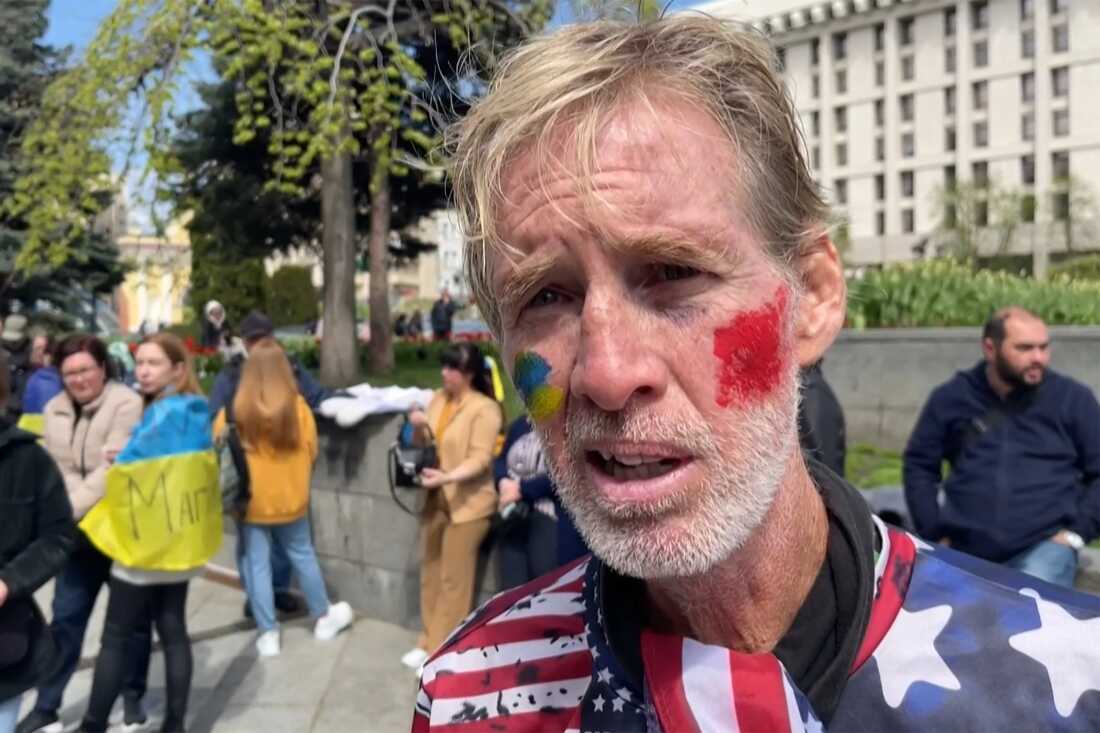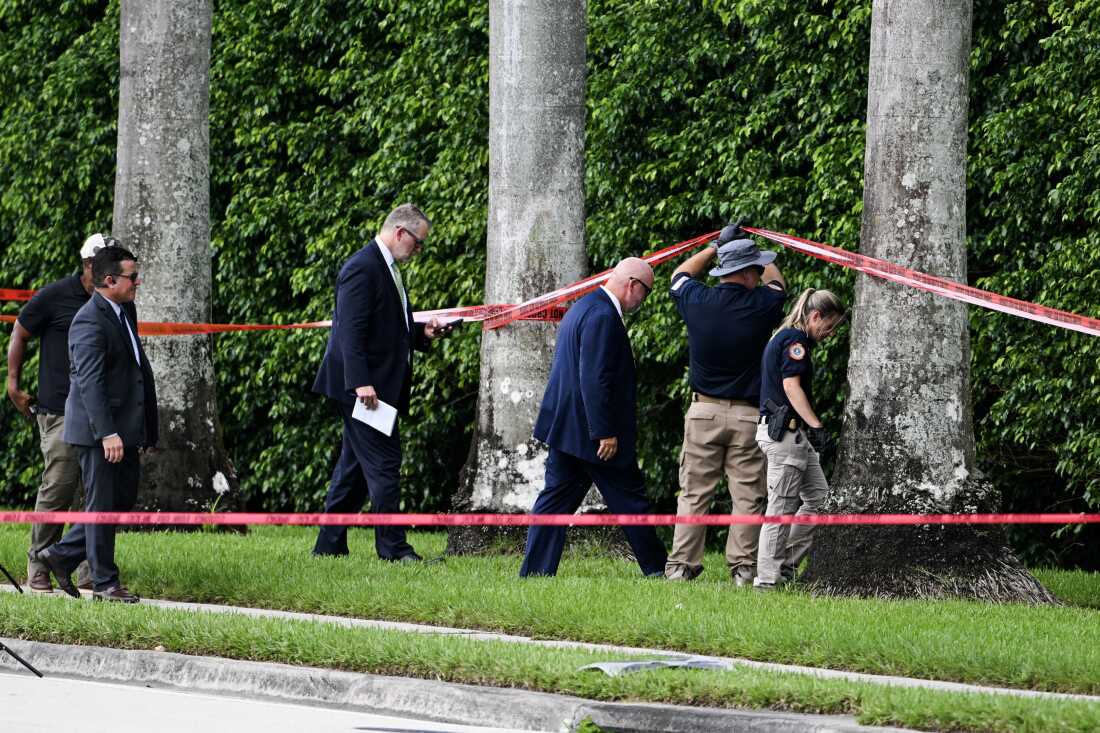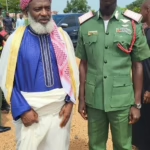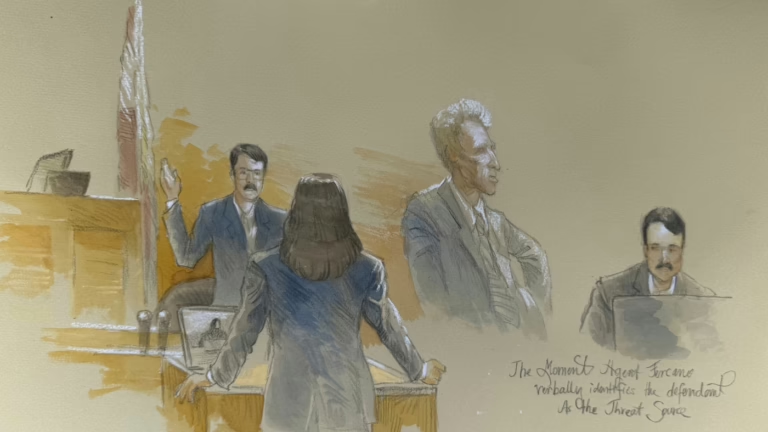Courtroom sketch depicting Secret Service agent Robert Fercano identifying the defendant on September 11, 2025, during the trial of Ryan Routh, accused of attempting to assassinate Donald Trump last year at a golf course in South Florida.
Lothar Speer/AP
FORT PIERCE, Fla. – On Tuesday, a federal jury found Ryan Routh guilty on charges related to the attempted assassination of former President Donald Trump, which occurred last year at Trump’s golf course in South Florida.

Routh was convicted on all five counts, which included attempted assassination and multiple weapons offenses. Although the rifle he allegedly intended to use was never discharged, prosecutors argued that Routh demonstrated clear intent and took significant steps toward carrying out the crime. He now faces a potential life sentence.
The prosecution concluded their case last Friday after presenting 38 witnesses over seven days, outlining what they described as Routh’s premeditated plan to attack the then-presidential candidate while he played golf at his West Palm Beach club on September 15, 2024.
The trial, which lasted approximately two and a half weeks, wrapped up faster than anticipated by both the prosecution and U.S. District Judge Aileen Cannon. This was largely due to Routh representing himself and conducting a brief defense, calling only three witnesses and spending minimal time cross-examining the prosecution’s case.
Routh’s defense spanned just a few hours, contrasting sharply with the prosecution’s extensive presentation.

Judge Cannon warned Routh before his closing statement to limit his remarks strictly to evidence presented during the trial. However, Routh repeatedly disregarded these instructions, leading to objections from the prosecution and a formal admonishment from the judge.
Explaining his limited defense, Routh told the jury he had intended to subpoena twenty witnesses and submit 500 exhibits, but court rulings prevented him from doing so. This prompted Judge Cannon to pause the proceedings briefly and issue a stern warning.
In his final remarks, Routh emphasized that the case hinged on “intent and whether someone can actually pull the trigger and take someone’s life.” Referring to himself as “the defendant,” he admitted to planning an attempt on Trump’s life while the candidate was on the 5th hole, approximately 375 yards from where the sniper was positioned. “The opportunity was there and the trigger was not pulled,” he stated. “The crime was not completed.”

Ryan Routh addressing a rally in Kyiv on April 27, 2022, calling on international leaders to establish humanitarian corridors for civilians and Ukrainian troops during Russia’s invasion.
Nicolas Garcia/AFP via Getty Images
Routh insisted he was incapable of taking a life. “Simply planning something does not equate to intent,” he argued. “It remains a dream, a fantasy,” one he never intended to carry out.
Prosecutor Christopher Browne, in his closing, systematically reviewed the extensive evidence demonstrating Routh’s intent to assassinate Trump. He questioned, “Why did he take these steps? Why did he load the rifle if he had no intention to kill?” In rebuttal, prosecutor John Shipley reminded the jury that an attempted assassination charge does not require the weapon to be fired or anyone to be shot.
Shipley opened the trial by asserting that Routh sought to prevent voters from electing Donald Trump in 2024. “The defendant chose to remove that choice from the American people,” he said. He described the plot as “meticulously planned and deadly serious.”
Former Secret Service agent Robert Fercano, now with the Department of Homeland Security, testified that he thwarted Routh’s alleged assassination attempt. Fercano recounted spotting a “face in the bushes” near the golf course as Trump played.
While scanning the 6th hole, ahead of Trump’s position, Fercano said, “I saw what appeared to be a person’s face and the barrel of a weapon sticking out from the fence line.”
He approached on his golf cart, initially suspecting the individual might be homeless and not an immediate threat. Fercano recalled, “I heard a groan and the subject smiled at me.”

Authorities investigate the scene outside Trump International Golf Club in West Palm Beach, Florida, on September 16, 2024, the day after the attempted assassination of then-presidential candidate Donald Trump.
Chandan Khanna/AFP via Getty Images
Fercano testified that as he backed away, the gun barrel moved toward him, and he noticed ballistic plates affixed to the fence, resembling a bulletproof vest. As a former Marine and trained marksman, he described the situation as “a textbook ambush.”
FBI Supervisory Special Agent Kimberly McGreevy also testified extensively over two days, presenting evidence tracking Routh’s movements in the month leading up to the incident.
Using data from six cell phones and surveillance footage, McGreevy detailed Routh’s travels between Mar-a-Lago, Trump’s golf club, the airport housing the president’s plane, and a truck stop where Routh lived in his SUV.
She stated, “He was residing at that truck stop, conducting both physical and electronic surveillance … effectively stalking the former president.”
McGreevy further described Routh’s acquisition of the SKS-style rifle found at the golf course and his efforts to obtain a more powerful firearm.
Text messages revealed by the agent included one sent to Routh’s girlfriend in Hawaii: “How many bullets does an SKS rifle hold? An AK-47 can shoot to 500 meters. I have to get to 400.”
Judge Cannon permitted Routh to represent himself after he expressed dissatisfaction with his court-appointed attorneys during pretrial hearings.
In his defense, Routh called two character witnesses who testified to his “peaceful, gentle, and non-violent” nature, along with a firearms expert, Michael McClay, a former Marine sniper.
McClay testified that when he test-fired the SKS-style rifle months after Routh’s arrest, the weapon malfunctioned, jamming after the first round. Prosecutors attributed this to acid damage from efforts to restore the gun’s obliterated serial numbers.
However, McClay’s testimony also supported the prosecution’s case. After surveying the golf course near the 6th hole, where prosecutors claimed a sniper’s position was established just outside the fence, McClay confirmed it provided “a clear shot” to the green.
When questioned about the rifle’s effectiveness at the 5th hole, where Trump was actually playing, McClay acknowledged, “Depending on the shooter’s skill, yes.”
Prior to this incident, Routh had a criminal history, including a 2002 felony conviction in North Carolina for possession of an explosive device. He spent much of his life in North Carolina before relocating to Hawaii. Routh was also known for his vocal support of Ukraine following Russia’s invasion and admitted to supporting Trump in 2016, a decision he later regretted.
This assassination attempt marked the second against Trump in 2024. The first occurred in July during a campaign rally in Butler, Pennsylvania, when a gunman fired from a rooftop, injuring Trump’s ear and killing a bystander. The shooter, 20-year-old Thomas Crooks, was killed by a Secret Service sniper.

















